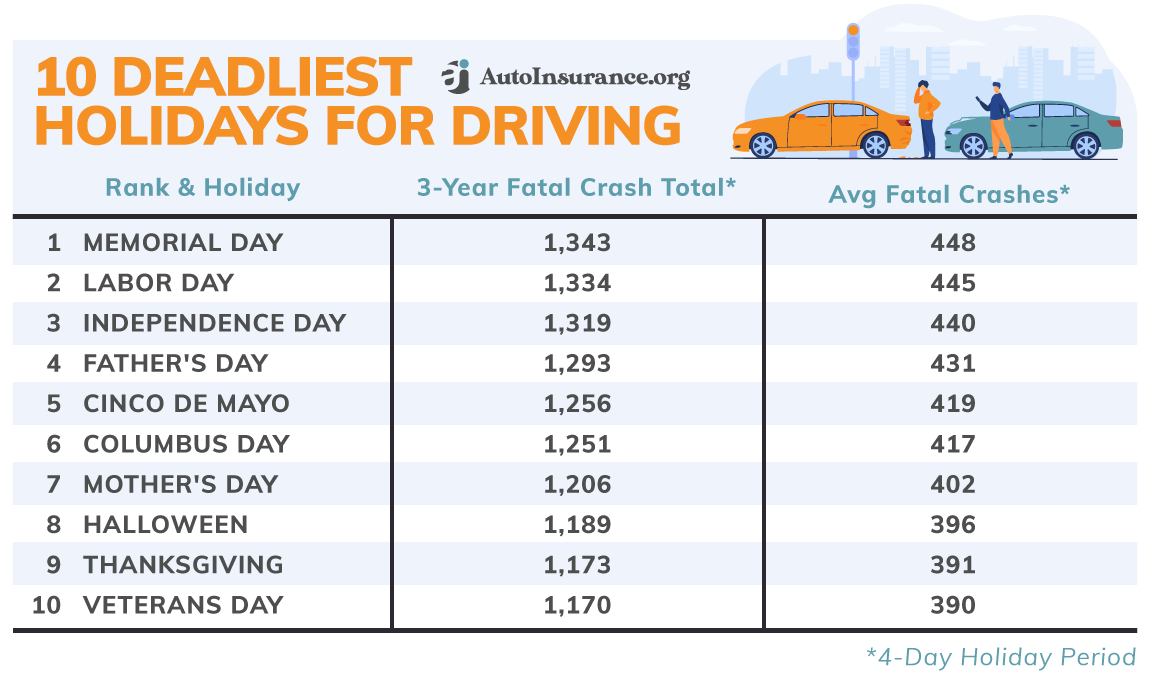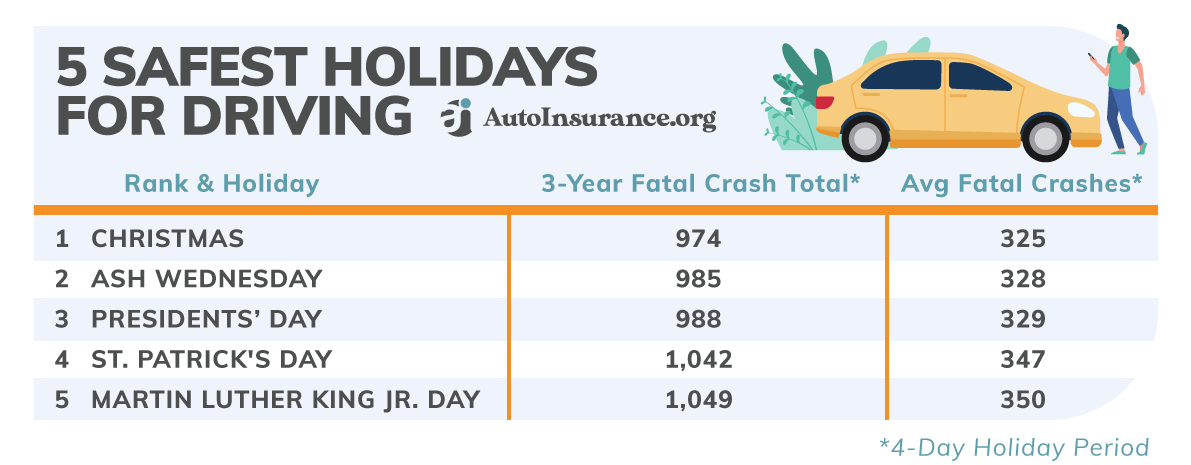Can Someone Drive My Car Under My Insurance State Farm
Editorial Guidelines: We are a free online resource for anyone interested in learning more about auto insurance. Our goal is to be an objective, third-party resource for everything auto insurance related. We update our site regularly, and all content is reviewed by auto insurance experts.
Things to Remember
- Out of all holidays, Labor Day is the 2nd-deadliest holiday to drive
- Labor Day is 20% more dangerous for driving than the average holiday
- Drunk driving accounts for as much as 38% of fatal crashes during holidays
- Up to 52% of traffic deaths during holidays involve someone not using a seat belt
We've all heard the stories: the drunk driving deaths on New Year's Eve, the traffic spikes and backups on highways during Thanksgiving weekend, the barbecues and drinking on Labor Day that can lead to fatal car accidents.
It can be perilous to drive on holidays. Consider this: during our study period, the average fatal crashes per four-day period was 372. For all 18 holidays we researched (including our 10 deadliest holidays to drive):
- Just seven had fewer fatal crashes than 372
- 11 (and all of our 10 deadliest holidays) had more than 372
You can see all 17 holidays we analyzed listed in the graphic below:
Traffic spikes, partying, drunk driving, and bad decisions all contribute to the deadliest holidays to drive. These accidents can cause your auto insurance rates to rise, which is why it's important to research the best auto insurance companies to get the right deal for you.
Labor Day is one of seven holidays in our ranking of the 10 deadliest holidays to drive that fall during the summer. It is tied as the worst holiday for drunk driving and seat belt use.
What are those holidays and which are the deadliest? Let's get started.
The 10 Deadliest Holidays to Drive
In this section with the 10 deadliest holidays to drive, you'll see a variety of events and cultural celebrations. With that comes differences in why one holiday is dangerous versus another. Some, however, have very common themes.
We'll walk you through those themes and the underlying reasons why some holidays are dangerous and some tend to be not as bad. Also, we include a helpful hint in each section that can keep you safe on that particular holiday.
The graphic below shows the 10 deadliest holidays for driving. All have average fatal crash totals of 390 or more for their four-day holiday periods.

By the end of this article, you'll be able to answer:
- What is the most dangerous day of the year to drive?
- What is the most dangerous holiday?
- What are the most dangerous times to drive?
- Which holiday is the deadliest traffic day?
- What holiday has the most fatal crashes?
Drumroll for number 10. Our first holiday might surprise you.
#10 – Veterans Day
- 3-Year Fatal Crash Total: 1,170
- Annual Avg. Fatal Crashes: 390
Veterans Day is observed on November 11 and was created to honor U.S. veterans, people who had served in the military. Unfortunately, it is the lead-off hitter in this list, coming in at No. 10 on our list of the deadliest holidays to drive.
Its three-year fatal crash total is 1,170, which means it averages 390 fatal crashes during that weekend.
For such a reflective holiday, the question becomes, "Why?" The answer with Veterans Day is that it falls on a Monday, creating a three-day weekend. For many, this gives people an extra day for partying. As we'll see, drinking and driving is a major cause of fatal crashes during holidays.
Helpful tip: If you drink on Veteran's Day and are too drunk to drive, don't try. Alcohol tries to convince you that you're "okay" and you "can handle it." Don't take the risk; instead, call a cab or rideshare taxi. If you're a rideshare driver, make sure to have rideshare insurance in case an incident happens.
#9 – Thanksgiving
- 3-Year Fatal Crash Total: 1,173
- Annual Avg. Fatal Crashes: 391
Thanksgiving is the time of turkeys and family get-togethers. The common version of the "first Thanksgiving" occurred between Pilgrims and the Wampanoag Native Americans in the Plymouth Plantation.
While harvest celebrations had occurred before in America and other countries, this tale grew in the nation's consciousness. So why is this such a deadly holiday to drive?
Thanksgiving week is usually the busiest week on the highways the entire year. Traffic is horrendous, with cities clogged with cars and interstates backed up due to accidents.
Axel Hernborg, CEO, of Trippolo, adds, "Because of the increased number of accidents and fatalities, holiday driving is especially hazardous. There's a lot to do in a short amount of time, which causes tension and a lack of patience."
On top of that, the major shopping holiday (Black Friday) can sometimes start the evening of Thanksgiving, which adds even more people to the road.
Helpful tip: If you choose to avoid a plane during these COVID-19 times, try leaving a day earlier (Tuesday) to reach your destination. Carpool with others or time traffic patterns to drive when congestion is the least. For long trips, avoid highway hypnosis by getting a good night's sleep and starting the trip early.
#8 – Halloween
- 3-Year Fatal Crash Total: 1,189
- Annual Avg. Fatal Crashes: 396
Halloween is a holiday enjoyed by many different age groups in different ways. The younger crowd (20s, 30s) generally parties, while the older crowd with families takes their children trick or treating.
Combining the two, it turns out, is deadly.
Because Halloween can be a partying holiday for some, there is a great deal of drinking. And especially when it falls on a weekday and people need to be at work the next day (this makes weekdays the deadliest days for Halloween), more people tend to drive drunk than typical.
Drunk driving mixed with trick-or-treating leads to a spike in child and pedestrian fatalities on this holiday. Drunk drivers — and even sober drivers — try to navigate dimly lit streets with children in sometimes dark costumes who may not know when to cross the street or not.
The collision, when it occurs, is tragic.
Helpful tip: Parents, put some type of reflective material on your child's costumes or treat bags so that when a car's headlights hit them, it reflects back on the vision of the driver. Also, never leave their side.
#7 – Mother's Day
- 3-Year Fatal Crash Total: 1,206
- Annual Avg. Fatal Crashes: 402
Mother's Day is always held on the second Sunday of May and seems very tame on the surface compared to others. However, the data shows that is not the case.
It ranks as the seventh-deadliest holiday to drive with 1,206 fatal crashes over the three-year study period with 402 average fatal crashes per year during its four-day holiday period.
So why is it such a dangerous holiday? If you look at the new s, you see all sorts of stories — drunk driving, hit and runs, and hazardous highways. The latter is rarely talked about and important.
In many cases, holiday fatal crash spikes occur in areas where the roads are just not as good. This is especially the case for holidays — like Mother's Day — that fall right after winter, when snow, sleet, and other weather elements can damage roads.
Helpful tip: Beware the state of highways and bridges in your area. When driving in rural country, use high-beams when necessary, drive slowly, and watch for animals.
#6 – Columbus Day
- 3-Year Fatal Crash Total: 1,251
- Annual Avg. Fatal Crashes: 417
Columbus Day, a holiday that is celebrated throughout much of the Americas, ranks sixth on this list of the deadliest holidays to drive. During our three-year study period, it had 1,251 fatal crashes or 417 per four-day period.
This is 46 fatal crashes higher than the average four-day period. Columbus Day starts the marker of a series of holidays where drunk driving plays a serious role in the number of fatal crashes.
It also lands on October 12, the end of fall, which is a prime fatal crash period. Why is Columbus Day weekend so deadly for crashes?
Partially, it is because this is the end of travel season and summer holiday season (especially in the Northeast with foliage season), where you consistently see the most traffic, long trips, tired drivers, aggressive drivers, and drunk drivers returning from summer parties.
Helpful tip: When planning a trip or even driving in your town or city, know whether the drivers are great or terrible, and if they are terrible, what their weak points are. The best drivers by state have great qualities, but many states have drivers with bad habits like drunk driving or reckless driving. Knowing this can help you prepare.
#5 – Cinco de Mayo
- 3-Year Fatal Crash Total: 1,256
- Annual Avg. Fatal Crashes: 419
Cinco de Mayo (May 5th) is a Mexican holiday that made its way to the U.S. Known for tacos and margaritas, Cinco de Mayo is a party holiday, no matter what day it falls on. And this makes it dangerous.
Nearly 37% of all traffic deaths on Cinco de Mayo are related to drunk driving, and the scary part is that in last year's study, Cinco de Mayo ranked 10th-deadliest out of all holidays. This year, it is fifth.
Cinco de Mayo's average drunk driving-related fatal crashes jumped by 27 in one year, and its three-year crash total spiked by 95 fatal crashes.
Is this an aberration or the start of a long-trending pattern? It's too early to tell, but with this holiday becoming more popular, it is likely we will see high fatal crash numbers for some time.
Helpful tip: You can familiarize yourself with the deadliest and safest states for drunk driving to learn if you live in or are visiting one of the states that deal with a high rate of drunk drivers. And if you plan on drinking, taking a taxi or carpooling to your party eliminates the possibility of driving drunk. One mistake can cost you, and potentially others, their lives.
#4 – Father's Day
- 3-Year Fatal Crash Total: 1,293
- Annual Avg. Fatal Crashes: 431
Father's Day is the fourth-deadliest holiday to drive. Father's Day averages a full 59 more fatal crashes than the average four-day period and 16% more fatal crashes than the average holiday. But it seems odd for such a relaxed and wholesome holiday.
So, why is it this dangerous?
It comes down to a recurring trend: a spike in traffic and a higher-than-average number of drunk drivers. Maybe the age-old custom of sharing a beer with your dad has serious consequences.
Helpful tip: There are many solutions to not driving drunk. One is to consider the consequences — not just loss of life through a fatal crash but jail time, fines, license suspension, lawyer fees, and more.
#3 – Independence Day
- 3-Year Fatal Crash Total: 1,319
- Annual Avg. Fatal Crashes: 440
Independence Day, July 4th, is consistently one of the most dangerous holidays to drive, and that did not change this year. With 1,319 fatal crashes over our three-year study period, it averages 440 fatal crashes per four-day period or 68 more than the average four-day period.
Independence Day has 19% more fatal crashes than the average holiday.
It is, in a word, deadly. Why? Here are some fatal crash statistics from the National Safety Council:
- 38% of all fatal crashes involve drunk driving
- 55,000 medically-consulted injuries occur from car accidents
- 303 lives could be saved if everyone wore seat belts
That last line is particularly devastating. Seat belt laws vary by state significantly, but 52% of traffic deaths on Independence Day weekend occur when someone isn't wearing a seatbelt.
Fatigue is also a factor on Independence Day weekend, as many people are making long trips during the holiday period.
Helpful tip: Most focus on child safety restraints when talking about seatbelts, but adults generally can make their own decision. This can be fatal. Buckle-up.
#2 – Labor Day
- 3-Year Fatal Crash Total: 1,334
- Annual Avg. Fatal Crashes: 445
Labor Day, the holiday observed to celebrate American workers, ranks as the second-most deadly holiday to drive. Its three-year fatal crash total is 1,334, for 445 average fatal crashes per four-day period. That's 20% more fatal crashes than the average holiday.
The fatal crash statistics on Labor Day are eerily similar to those of Independence Day:
- 38% of fatal crashes involve an alcohol-impaired driver
- 52% of traffic deaths occur when someone isn't wearing a seat belt
Labor Day is the last of the summer holidays as well, a time when people are traveling to see family or vacationing. This leads to traffic spikes and more fatigued drivers and creates more opportunities for fatal crashes.
Helpful tip: While drunk driving is the main issue in the worst states for traffic-related fatalities, distracted driving causes many fatal crashes as well. Keeping your eyes on the road, eliminating distractions like cell phones, and making sure the kids are occupied can keep you focused. You can also leave for your destination a day early or stay there a day late to avoid heavy traffic.
#1 – Memorial Day
- 3-Year Fatal Crash Total: 1,343
- Annual Avg. Fatal Crashes: 448
Memorial Day, the most somber of all holidays, is actually the most dangerous holiday to drive. Over our three-year study period, it had 1,343 fatal crashes or 448 fatal crashes per four-day holiday period.
Memorial Day has 76 more fatal crashes than the average four-day period and 21% more than the average holiday.
The statistics are blunt and telling:
- Car crashes are 4X more likely on Memorial Day weekend
- 37% of fatal crashes involve a drunk driver
- 52% of traffic deaths occur when someone isn't wearing a seat belt
- 12 red lights are run through every second during the weekend
While drunk driving and traffic spikes (Memorial Day is the first holiday of the summer and kicks off vacation season) are the main catalysts for fatal crashes, there are others. Drivers may become frustrated with summer road construction, traffic, the heat, and be more aggressive. This results in more accidents.
Helpful tip: Drive slowly to take into account others' reckless driving behavior. Stay in the right lane for safety. For long trips, give yourself plenty of time and stay at rest stops if needed. Fatigue can be a major factor in car accidents.
The 5 Safest Holidays to Drive
Okay, deep breath. Calm. While those were the deadliest holidays to drive, here we have the safest holidays to drive. These five are actually under the four-day average for fatal crashes. They are safer, with the roads much easier to navigate during these periods.
The graphic below shows the safest holidays to drive. Compared to the 10 deadliest holidays to drive, they have much fewer fatal crashes, both as a three-year total and an average fatal crash total for their four-day holiday periods.

There is a pointed difference between these five and the most dangerous 10. We'll cover that at the very end.
#5 – Martin Luther King Jr. Day
- 3-Year Fatal Crash Total: 1,049
- Annual Avg. Fatal Crashes: 350
Martin Luther King Jr. Day, celebrated on Jan. 17, is the fifth-most safe holiday with a three-year crash total of 1,049. Each holiday period averages 50 fatal crashes, which is 22 lower than the four-day general average.
MLK Day benefits from a few cultural habits. MLK Day is not a particularly big party day, coming right after New Year's Eve, and seen as a holiday to chill rather than drink heavily.
It's also in January, one of the months with the lowest traffic and fatal crashes, likely due to the inclement winter weather.
#4 – St. Patrick's Day
- 3-Year Fatal Crash Total: 1,042
- Annual Avg. Fatal Crashes: 347
St. Patrick's Day, celebrated on March 17 with green Guinnesses and shamrocks, is the fourth-safest holiday with a three-year crash total of 1,042. Its 347 fatal crashes per holiday period is 25 lower than the four-day general average.
St. Patrick's Day is a party holiday, but the main feature is pub crawls rather than drive to a place and drink. This may limit the number of fatal crashes.
It is also in March, which is another low month for traffic and fatal crashes as many states are still experiencing snowfall and the weather hasn't warmed up yet.
#3 – Presidents' Day
- 3-Year Fatal Crash Total: 985
- Annual Avg. Fatal Crashes: 329
Presidents' Day, celebrated the third Monday of February, is the third-safest holiday to drive, with just 985 crashes over our three-year study period. Its 329 fatal crashes per year is 43 below the four-day general average.
Presidents' Day is seen more as a time to unwind and take a break from the first couple of months of work.
It also falls during February, a low traffic and fatal crash month, one with significantly bad winter weather that usually keeps people indoors and not behind the wheel.
#2 – Ash Wednesday
- 3-Year Fatal Crash Total: 988
- Annual Avg. Fatal Crashes: 328
Ash Wednesday is a Christian Holiday and one that generally falls between mid-February and mid-March, six weeks before Easter. During our three-year study period, it had just 988 fatal crashes or 328 per year. That yearly total is 44 below the general four-day period.
Ash Wednesday is not just a holiday that doesn't inspire drinking — it actually requires adherents to fast, meaning no solid food or drink. And definitely no alcohol.
Falling during winter or spring as well means that the levels of traffic are low. Those two factors likely contribute to the low number of fatal crashes.
#1 – Christmas
- 3-Year Fatal Crash Total: 974
- Annual Avg. Fatal Crashes: 325
Christmas, celebrated December 25, is the safest holiday by far with just 974 fatal crashes during the three-year period. Its 325 fatal crashes per year are 47 below the four-day general average.
Certainly many people drink during Christmas, with spiked eggnog and other adult beverages floating around. However, m ost families stay in their homes that day, preferring to spend time with each other rather than driving, unless it is to pick up some last-minute ingredients for cooking.
Both of those factors, in addition to the cold, limit traffic on the road, which brings down the number of fatal crashes. Still, it's important if you're driving in winter weather to be safe.
Tips for Safe Driving During the Holidays
Even with all the tips, you might be wondering how you can stay safe while driving during the holidays. After all, you can't control a drunk driver or a reckless driver, right?
While that is true, there are numerous driving tactics you can use to keep yourself more safe than otherwise. Here are 10 driving tips to keep you safe during the holidays.
- Keep a safe distance between you and the car in front of you
- Yield the right of way rather than take it
- Drive slowly and carefully
- Eliminate distractions like cell phones and tablets
- Always have your eyes on the road
- Two hands on the steering wheel
- Learn tricks to drive in inclement weather
- Pay attention to road signs
- Be aware of erratic drivers
- If frustrated or angry, take deep breaths and focus
On the topic of safe driving tips, Jill Miller, travel expert with Your RV Lifestyle, says, "To be safer, you can make sure everyone is buckled up, keep to the speed limit, stay off your phone, and take regular breaks. You must also take extra precautions, such as snow tires or chains if necessary."
Get regular, scheduled car maintenance. Deflated tires, cars running low on oil, and windshield wipers that are torn can all affect your ability to drive safely.
Guidance & Personal Stories About Driving During the Holidays
In this section, thought leaders from all around the world share their experiences driving during the holidays and tips on how to stay safe. They are business leaders, travelers, and even one former police officer. Enjoy.

What makes driving on holidays so dangerous?
"There are multiple reasons that the holidays are such a dangerous time of the year for drivers. Although the holidays are an amazing time for family get-togethers, it is also a stressful time. Because of this, there is a spike in aggressive driving and collisions.
In addition to this, there is an increase in traffic during the holidays. Finally, holiday functions that serve alcohol increase impaired or intoxicated driving."
Why are some holidays more dangerous than others?
"Generally speaking, holidays increase the volume of traffic on our roads, which also increases the chances of being involved in a collision. However, holidays such as Memorial Day and Labor Day are usually celebrated with cookouts and all-day events, often accompanied by alcohol use. This can then lead to an increase in impaired or intoxicated driving during the holiday weekend."
What are organizations in your area doing to prevent traffic deaths during the holidays?
"As a former police officer and deputy sheriff that worked in Bluffton and Beaufort County (SC), our local agencies increase traffic and DUI enforcement. The 911 Driving School Hilton Head uses social media accounts to post helpful driving tips and reminders while also teaching our young drivers the dangers of distracted and impaired driving."
How do you think the COVID-19 pandemic has or will impact dangers on the roads during holidays?
"With COVID-19 restrictions lifted in many places, families will travel again to see the loved ones that they were not able to visit during the height of the pandemic, thus increasing the traffic volume. We could see our major highways and interstates become more congested, increasing traffic accidents."
What are some steps people can take to remain safe on the roads during the holidays?
"While traveling, remember to slow down and be more alert, especially in heavy traffic. Try to reduce your distractions and limit your phone use to when the vehicle is parked. Do not drive tired; driving while fatigued can be as dangerous as distracted or impaired driving. Take breaks to stop and rest if you begin feeling sleepy or tired."
What steps do you personally take to minimize danger while driving during the holidays?
"I tend to plan out our holiday road trips. We always fill up and pack the car the night before. This way, we are not rushing to try and leave. We also pack a cooler with drinks and snacks for the ride, just in case we get stuck for a long period of time."
Do you have any personal stories about the dangers of holiday driving?
"An event that stands out is one Thanksgiving when we were returning home from the mountains and were traveling on I-40 in North Carolina. Traffic was not bad, but steady. After moving over to exit on to I-26, a driver sped around me, came up alongside my truck, and began acting as if he had a gun.
The driver had been speeding and weaving in and out of traffic, and although I did not cut him off, he was upset that I moved into his lane. Luckily, I was able to see that he did not have a gun, and I was able to get away from him safely."
 David Murphy is the owner of the 911 Driving School.
David Murphy is the owner of the 911 Driving School.
He is a former police officer and deputy sheriff.
"Alcohol and drugs impair your judgment, coordination, and reaction time. This can be a significant problem on holidays when you may consume more alcohol than you usually do and opt for driving while inebriated.
For these reasons, you mustn't ever drive while on drugs or have consumed alcohol or even if you are tired, as this causes a distraction. You should also not move too fast and give yourself more room.
Perhaps the most obvious step to reduce fatalities is to simply make roads safer. Roads in the US are built and maintained to be as safe as possible, with signage and speed limits, but these are often not followed.
Many states even have laws that say "no texting while driving," but this only causes more accidents because drivers move their eyes from the road for a secondary source of information or place themselves in danger by crossing streets with no traffic lights against pedestrians crossing.
I generally prefer road trips and have frequently visited Blue Ridge Parkway near Mount Mitchell in North Carolina.
COVID-19 pandemic is a severe problem for many countries around the world, including the US. Many countries have people traveling on roads during the holidays, and the virus could spread quickly.
People should not go out and buy unnecessary stuff in stores and supermarkets during these holidays, increasing the risk of coronavirus spread. People should wear masks, wash their hands frequently and avoid touching any part of their body.
I follow all the hygiene steps and wear a mask while traveling out, even if it is for a holiday. I plan accordingly by avoiding those destinations which are famous and have a chance of heavy foot traffic."
 Lynda Fairly is the co-founder of NumLooker.
Lynda Fairly is the co-founder of NumLooker.
Numlooker is an online grey pages directory.
"As an avid road-tripper myself, and having traveled many holidays with my family, I have come across the following information.
The No. 1 reason why driving on holidays is more dangerous than regular days, is because of the traffic increase. Individuals and families who live close enough to other family members and don't have to fly will likely choose to drive to holiday get-togethers.
Increased traffic on the road leads to more potential for car accidents, drunk driving, and road rage.
Statistically, Memorial Day is the worst holiday for deadly car accidents. Everyone is excited about the start of summer and camping season, which leads to a large increase of traffic on the road.
New Year's and the 4th of July are also in the top five most dangerous holidays for driving, according to my research. New Year's because of alcohol-related crashes, and the 4th of July is the peak of summer driving combined with construction season. This causes traffic backups, short tempers, and impatience.
I live in Michigan and have seen something called LSI programs enacted by townships. This stands for Local Safety Initiatives. It's supposed to implement low-cost fixes to potentially hazardous roads or specific stretches of highways.
Improper signage is often a factor for fatal crashes. When proper warning signage is not in place, Local Safety Initiatives try to implement better signage for advance warning on hazardous road sections.
Our advice to individuals or families traveling during holidays is to plan accordingly. Know the roads will be busier than normal and plan ahead by factoring in more driving time. Check your driving route ahead of time to see if there is construction along your route.
If traveling with children, bring the proper food, water, and entertainment in case of delay. Most of all, expect the unexpected: car accidents backing up traffic, detours due to construction, or drivers ignoring vehicle safety. Plan for a possible flat tire or getting pulled over. Have your vehicle registration and insurance up to date to minimize delays if you are indeed pulled over."
 Joel Speyers is the co-founder of Prep4Travel.com.
Joel Speyers is the co-founder of Prep4Travel.com.
He's an avid traveler who writes road-trip travel guides.
What makes driving on holidays so dangerous?
"There is a greater danger in driving during the holidays because people are in a rush. For example, those who want to get to the shopping mall early will do what they can to beat the others to it. Holidays are also notorious for people winding down.
What I mean by this is that people drink. And sometimes, they drink too much. The problem with some people is that they tend to overestimate their capacity to drive even when drunk."
Why are some holidays more dangerous to drive on than others?
"It is because some holidays drive people into a frenzy. Some holidays make people drink more. Here are some stats regarding the average amount of drinks each person drinks during the most alcohol-heavy holidays.
- Mardi Gras: 4.5 drinks per person
- New Year's: 4.4 drinks per person
The holidays with the least drinks per person are Thanksgiving Day with 2.7 drinks per person and Christmas with 3.1 drinks per person. As you can see, there are differences in how people drink on different holidays."
How do you think the COVID-19 pandemic has or will impact dangers on the roads during holidays?
"Well, COVID-19 made people get stuck in their houses. Bars are closed, and people cannot party. If they drink, they can only do so in the confines of their homes. It means that they will not have to drive. As such, no accidents can occur due to drunk driving."
What are some steps people can take to remain safe on the roads during the holidays?
"A drink or two should be enough. This way, you are still in control of yourself. Driving drunk is one of the leading causes of accidents on the road. As you know, intoxication impairs a person's motor function and perception.
People can have fun. I am all for that. However, they must also have the discipline to say no to too much drinking. The last thing you want is the guilt that you will carry with you all your life should you get into an accident."
What steps do you personally take to minimize danger while driving during the holidays?
"I do not drink and drive. During the holidays, I also make sure I operate within speed limits. I control my temper, and I do not go into road rage."
 Max Eiten is the owner of Fish Tank Authority.
Max Eiten is the owner of Fish Tank Authority.
His site provides guides for fish and aquarium care.
"Driving drunk isn't the only danger during holidays. Extreme speeding, reckless driving, and aggressive driving can all lead to serious consequences. The best time of year can quickly become a nightmare when people rush to holiday events. However, there are steps you can take to reduce the risks and keep your holiday season safe."
What makes driving on holidays so dangerous?
"Holiday driving is considered dangerous due to the increased number of accidents and deaths. It is difficult to do everything in a short time span, leading to more stress and less patience. The pandemic compounds the problem; stress levels are at an all-time high, and more people are likely to hit the roads this year rather than flying because driving allows for social distancing.
Many people enjoy a cup of spiked cider or eggnog during the holidays. According to a report of the U.S Transportation Department, more than 750 people died in road accidents this year in December because of drunk driving. While the season is full of joy and laughter, it also means that there are more impaired drivers on our roads.
Accidents can occur at any time, but the holiday season presents a unique set of dangers that could pose a threat to everyone's safety.
Holiday accidents and deaths are often caused by drunk driving. Even though there are fewer holiday events in person this year, it is still possible for a normally cautious driver to take the wheel while impaired.
The winter season can be dangerous due to inclement weather. Holidays can be dangerous due to snow, hail, high winds, and black ice. Many holiday drivers are exposed to dangerous conditions while driving.
Stressed drivers can be especially common during holidays. People may travel farther than usual, feel more pressured for time, and tensions could be higher this year due to COVID-19."
 Muhammad Ijaz Ahmad is a writer for APKStreams.com.
Muhammad Ijaz Ahmad is a writer for APKStreams.com.
His site provides APK mods and Android games.
What makes driving on holidays so dangerous?
"There are a few factors that make holiday driving dangerous.
First is unfamiliarity with the destination and conditions. For example, you may have driven in snow, but snow and ice and not the same thing. And, some destinations' climate changes on a dime. One example is Florida: A storm can erupt from nowhere and give you "sheet" rain—the type that keeps you from seeing the car in front of you.
Not knowing local road laws is challenging, especially speed limits. In some places, signs are not written in English; this makes it really challenging if you lose signal and have no GPS.
Corrupt policing is another problem. Some countries are known for corruption. For example, if you get pulled over in Colombia, there is a strong chance you are about to be pressured into a bribe by the police.
Getting lost or breaking down is another danger. Depending on where you are, this can be a non-issue or a life-threatening event. Many travelers have been robbed or carjacked as a result of ending up in the wrong location.
I think it's worth pointing out that long before you decide to drive a car overseas, you need to do some serious research. Some areas are not worth the gamble, and you should hire a local driver."
Why are some holidays more dangerous to drive on than others?
"Climate for sure affects holiday travel; snow and ice can make some holidays more dangerous than others."
What are organizations in your area doing to prevent traffic deaths during the holidays?
"In Florida, very little, in my opinion. Renting a car is as easy as showing up at the rental desk."
How do you think the COVID-19 pandemic has or will impact dangers on the roads during holidays?
"The pandemic will impact road dangers significantly, especially in the USA. Here, many people opt to drive rather than fly due to COVID. This means the number of accidents will rise."
What are some steps people can take to remain safe on the roads during the holidays?
"Research the destination, and become familiar with the local customs and weather. If you are driving somewhere that will present unusual weather that you are not used to, then research and study how to drive in those conditions. An example of this is snow: Will you need snow tires or snow chains on your tires?"
Do you have any personal stories about the dangers of holiday driving?
"Driving the Golden Circle in Iceland is something that almost all tourists do. It's a fantastic trip out until it turns dark and the show falls. Even if you diligently check the weather, it can change rapidly.
We had the misfortune of driving back over unlighted mountains in a snowstorm that was not on the radar. When we started to head back (before darkness), others had already become stranded. We stopped to help, but they already had help on the route. And while it was initially light, it got dark very quickly.
I think we were lucky to make it over the mountain. If we had not gotten through, we could have easily been snowed in on top of a mountain."

Nikki Webster is a travel writer for Brit on the Move.
She has visited 54 countries, 50 states, and six continents.
"There are a couple of reasons why driving during the holidays is so dangerous, including the increase of drinking, drivers in unfamiliar areas, increased traffic (vehicle and pedestrian), and dangerous weather conditions (depending on the holiday).
During the holidays, families and friends get together, which means that you are going to have people driving to and from locations they are not familiar with.
Holidays equal celebration, which equals booze and activities where people are outside.
Winter holidays are more dangerous because of the added snow, ice, and storm aspects. Even a totally sober and aware driver can hit a patch of black ice and end up crashing. Another dangerous holiday is Halloween. When it's dark out, it is automatically harder to see, and with kids and adults freely roaming the streets, you have to be extremely cautious.
The pandemic has made the roads slightly safer during the holidays in that it decreased the number of people traveling, which decreased the number of cars on the road in general. Quarantines and enforced social distancing ensure that fewer people will make trips to houses other than their own.
If you can, try to avoid driving at night during the holidays. It is more dangerous when it is dark out due to less visibility, and drunk driving is exponentially more common at night."
 Brian Donovan is the CEO of Timeshatter.
Brian Donovan is the CEO of Timeshatter.
He helps consumers get out of unfair timeshare contracts.
What makes driving on holidays so dangerous?
"Driving isn't dangerous as a direct result of a holiday, but it is dangerous as these holidays often involve events and family gatherings where alcohol is a staple. Combine that with the roads being flooded with so many people around the same time, and that's what creates this disastrous recipe."
Why are some holidays more dangerous to drive on than others?
"Some holidays are more dangerous to drive than others because of the different variables that are in play. For example, St. Patrick's day is a holiday where drinking is the most popular feature; on top of that, the roads will be extra busy because of the 'bar hopping' factor in place. The same might apply for New Year's Eve, but for different reasons.
People are driving very late at night or early in the morning on New Year's Eve, and it's quite probable that many of these people are fatigued or intoxicated on some level, which can lead to fatal driving mistakes.
Some holidays are in between, and some are on the safer end of the spectrum, such as Christmas. On Christmas, you might have a lot of drivers in the morning, or even in the days prior."
What are organizations in your area doing to prevent traffic deaths during the holidays?
"Quite a few local establishments around here come together to offer free delivery for meals and even essential groceries. The police department in our neighborhood actually offered free rides home last year if there was anyone who had no other options but to drive in an unsafe or unfit condition."
How do you think the COVID-19 pandemic has or will impact dangers on the roads during holidays?
"People have been cooped up for over a year now, and people are ready to get out and enjoy their holidays again. I feel the roads will be far busier this year during the holidays than in years past, and certainly more busy than last year. "
What are some steps people can take to remain safe on the roads during the holidays?
"Travel as a group in the smallest number of vehicles possible this holiday season. One less car on the road will be one less potential accident. We need to lower the odds of crashes.
If you are going to drink throughout the day during the holidays at a family gathering, do everyone a favor, including yourself, and stay the night there.
If you have been drinking in celebration and must get home, there are so many options available other than turning that ignition over yourself. Uber, the local Police Department, or a sober friend are all safer options. You can also take a few hours and sober up beforehand."
What steps do you personally take to minimize danger while driving during the holidays?
"I travel at times that most people will not. For holidays like Christmas and Thanksgiving, I now either travel the day before or very early in the morning: this is to avoid the surge in holiday traffic. We now also stay the night on most holidays when with family.
Do you have any personal stories about the dangers of holiday driving?
"I feel it would be hard to say that anybody advocates against drunk driving more than my family does, all because of what happened last year on Thanksgiving. My sister and her family were driving home from Thanksgiving at our parents' house when they were in a 3-way accident involving a drunk driver.
My brother-in-law, who was driving their family, ended up in the hospital with four broken ribs, while a passenger from another vehicle passed away as a result. This has been one of the most devastating events we have experienced as a family, and every holiday since then, we have all stayed the evening at the house we were celebrating at."

Thomas Zheng is a Veterinary Advisor at GrubbyCat.
GrubbyCat provides vet-approved advice to cat owners.
"It is more dangerous to drive during holidays because there are high rates of accidents and fatalities during these high-traffic times. Many people have a lot to do during the short holiday period. Because of this, people are more impatient and have increased levels of stress.
As reported by the National Safety Council, some holidays are more dangerous to drive in than others. Independence Day ranks as the most dangerous holiday, while Christmas is always the safest.
Alcohol consumption is the leading cause of accidents during holidays. It is reported that drunk drivers cause 35% of accidents on Christmas.
I usually drive in Washington during the holidays, and I have witnessed several accidents. Most of the accidents in Washington occur due to drunk driving, and that is why organizations like Mothers Against Drunk Driving (MADD) are fighting to end the vice. MADD supports victims of drunk driving and aims to prevent underage drinking.
As the fight continues, the COVID-19 pandemic made people more stressed. Statistics reported increased fatalities even though Americans drove less in 2020. However, many of the drivers were driving under the influence, endangering lives.
To be safe on the road, people need to ensure that they drive while sober. They also need to drive defensively, moving with caution while paying attention to other motorists, in order to be safe. I usually take precautions like ensuring that my car is serviced, planning for the weather, and avoiding texting while driving.
It is always good to be careful, and you can choose to leave early to avoid traffic, which can appear from nowhere."
 Katherine Brown is the founder of Spyic.
Katherine Brown is the founder of Spyic.
Spyic is a remote monitoring app for parents.
What makes driving on holidays so dangerous?
"There are three reasons why driving over the holidays can be so dangerous.
1 – People drive longer than usual. People driving back home for holidays or for vacations drive longer distances than they are used to. The ability to concentrate while driving is a bit like physical fitness — if you don't use it, you lose it. Therefore people driving long distances who are not used to doing so are more likely to be involved in accidents due to lapses in concentration.
2 – There is a higher rate of driving under the influence: Alcohol consumption rises during holidays, and incidences of driving under the influence correlate with this.
3 – Road trips lead to higher incidences of distracted driving. Driving long distances with young children, pets, and extra luggage can increase the likelihood of a driver getting distracted on the road. This, combined with the difficulty of driving on unfamiliar roads, can increase the chances of an accident occurring."
Why are some holidays more dangerous to drive on than others?
"Holidays that cause people to drive on unfamiliar roads are the most dangerous. Therefore holidays where people tend to take extended periods of time off work, such as Christmas, Thanksgiving, and summer breaks, are the most dangerous for driving."
How do you think the COVID-19 pandemic has or will impact dangers on the roads during holidays?
"I expect that holiday road accidents will increase in 2021 as more people are opting for road trips over flying or leaving the country for their summer vacation.
Again, drivers who are not used to driving long distances are more likely to have accidents when they do so, and there will be many such drivers this summer."
What are some steps people can take to remain safe on the roads during the holidays?
"If you are traveling long distances, then take breaks at least every hour and a half. If you are traveling consistently for several days, then be very vigilant about the amount of sleep you get. Fatigued driving causes as many accidents as driving under the influence."
What steps do you personally take to minimize danger while driving during the holidays?
"In addition to taking regular breaks, I am very strict with my children about not causing any distractions when I am driving. This means clamping down hard when they are fighting, making a lot of noise, or asking me a lot of questions while I am behind the wheel."
Do you have any personal stories about the dangers of holiday driving?
"Yes, in December 2019, we had a 60 percent rise in the number of auto-repair jobs we had compared to the average of the three months previous."
 Mike Skoropad is the CEO of United Tires.
Mike Skoropad is the CEO of United Tires.
His company sells quality used tires
"Driving during the holidays seems to have grown in danger as we become a more globally connected world. More frequently now, we see people traveling to a host of different locations in order to celebrate holidays with various loved ones.
Of course, as more people do this, the busier the roads get, the longer the travel gets, and the more people are in a rush to get to where they need to be. The time surrounding Christmas is the perfect example of this, with many young adults and families traveling to see older relatives.
The problem is, most people finish their work for the holidays on the same date and time. Many people make their travel plans at the same time and rush to get back with their families, creating dangerous road conditions.
A way to make yourself safer, and avoid the panicked rush, is to travel slightly later. You can add on the missed days off to your holiday at the other end of the break. This will help you miss that mad Friday-before-Christmas chaos that can lead to dangerous driving.
Remember that if everyone is in the same rush, it will cause more problems and more danger, so taking a more relaxed approach to driving home for any holiday is safer for you and everyone else on the road. We don't have to rush to be everywhere; we will still arrive if we leave later and still be able to celebrate."
 Philip Westfall is the director of marketing for RVezy.com.
Philip Westfall is the director of marketing for RVezy.com.
He is a tech enthusiast specializing in RV rentals.
What makes driving on holidays so dangerous?
"People are in a hurry and often stressed on holidays. Roads are congested, people are driving in from out of town, and distractions abound. There's also the huge danger of people drinking and driving on holidays."
Why are some holidays more dangerous to drive on than others?
"Some holidays such as Christmas are considered to be 'travel' holidays, meaning the roads are backed up and full of out-of-towners. Some holidays like the 4th of July feature drinking as a big part of the celebration."
How do you think the COVID-19 pandemic has or will impact dangers on the roads during holidays?
"Last year, our fleets saw fewer accidents during holidays and fewer fatalities caused by said accidents. But most domestic travel restrictions have been lifted, and I think we will soon return to 'normal' numbers."
What are some steps people can take to remain safe on the roads during the holidays?
"Don't drink and drive, of course. Don't let someone else do it, and definitely don't get into the car with someone who's intoxicated. Assume the other drivers are going to be reckless and drive with extreme caution. Minimize distractions, and if you're feeling overwhelmed, pull off the road to collect yourself."
What steps do you personally take to minimize danger while driving during the holidays?
"I sometimes have anxiety while driving, so that last tip I mentioned is one I practice often. Even just a few minutes of breathing exercises can be helpful."
 Daivat Dholakia is the Director of Operations at Force by Mojio.
Daivat Dholakia is the Director of Operations at Force by Mojio.
Force by Mojio provides GPS fleet tracking for small businesses.
"I think the most dangerous holiday driving comes when we are expected to be somewhere for a certain day to celebrate. Everything can all of a sudden feel like there is a time limit, making more drivers rush to get to where they need to be, and creating more frantic driving to be somewhere at an imagined deadline they have essentially assigned themselves.
With everybody doing the same thing on one particular day, it only means more frantic driving because of heavier traffic slowing people down, and only adds to that likelihood of danger for everyone.
Christmas and Easter are a bit easier to deal with, as people tend to have a longer stretch of time off, meaning that everyone's travels are more staggered.
Everybody is traveling at the same time on single day or weekend events such as 4th July or Thanksgiving, which is where danger can escalate on the roads quickly.
It is hard to control people wanting to move between locations for these events, no matter how much you publicize safety and caution, so for my own safety I would consider taking an extra day off work on either side to allow for safer travel.
As well as a higher traffic police presence at key times to help ensure safer driving, it would be beneficial for business owners to be active in helping create safety. Business owners can offer an extra day off for employees over certain holidays, possibly as a reward for good work, or just as a general practice for their teams.
However they approach it, it can be a great way to help keep the roads emptier during these busy times.
If more people and businesses start to think this way instead of thinking it is somebody else's problem to fix, it could really help to create more scattered traveling plans, meaning fewer people trying to travel at the exact time, creating safer roads for everyone traveling during the holidays.
COVID-19 is only likely to cause more problems, as people get used to being on the roads at busier times.
Drivers have had the luxury of empty roads for any short travels they have done since the beginning of the pandemic, and now it will be even more important that people stay focused and don't rush over the holidays, because while drivers may still feel in control, as with anything, less practice is likely to mean slower reaction times."
 Will Hatton is the founder of The Broke Backpacker.
Will Hatton is the founder of The Broke Backpacker.
Will has been traveling on a budget for nine years.
"Over the past year, more people than ever before have been driving. While planes were formerly the most popular form of long-distance travel, lately, flying has been uncomfortable, and many don't feel safe doing it anymore. Because of this, driving has become the primary way people are traveling for vacation and other events now.
Holidays are already a time people are most likely to use for travel. This shift in how we travel means not only are more people driving around the holidays, but they're driving longer distances than they may have before. However, there are some steps you can take to minimize the danger while driving over holidays:
Don't overexert yourself. If you're getting tired, you should pull over, and if you are driving with someone, make sure to switch off who's driving to avoid fatigue. It's safer to spread out your trip into a manageable two or three-day trip than to try and cram all the driving in one day.
Get your car checked. If you've been putting off an oil change or recently heard a strange noise coming from your breaks, make sure you deal with that before you hit the road. Otherwise, you may end up on the side of it.
Prepare for the weather. If you're traveling in November or December, especially in cold areas, make sure to put an extra blanket in the car — and if you're driving up north, don't forget to bring your snow chains. For the summer, make sure you have coolant and extra water. While ideally, you won't need any emergency supplies, it's better to be safe than sorry."
 Kirsten Reneau is a consultant for Superior Honda.
Kirsten Reneau is a consultant for Superior Honda.
Superior Honda sells certified pre-used cars.
What makes driving on holidays so dangerous?
"Holiday driving is dangerous because there are more people on the road. In my experience, there are also more intoxicated drivers during holidays than on typical days. On top of that, people seem to rush during the holidays; they want to do so much stuff, but they do not have adequate time."
Why are some holidays more dangerous to drive on than others?
"Not all holidays are the same. Mardi Gras, for example, is a time for drinking. The same thing is true for St. Patrick's Day, and the drinking activities surrounding the holiday make it dangerous. On the other hand, Christmas and Thanksgiving are themed towards dinner and shopping."
What are organizations in your area doing to prevent traffic deaths during the holidays? Please state where you live, work, or drive the most during the holidays.
"I live and work in Grand Haven, Michigan. Our local police here have regular patrols. Each officer works a 12-hour shift for seven straight days in 2 weeks. Because of police presence, we have a low crime rate. We have highly visible patrols on foot as well as on bicycles and motorized vehicles."
How do you think the COVID-19 pandemic has or will impact dangers on the roads during holidays?
"COVID-19 has a positive impact because many people will not risk going on the road unless necessary. As fewer people are on the street, the likelihood of accidents is also smaller."
What are some steps people can take to remain safe on the roads during the holidays?
"I would advise people not to drink and drive. Drugs and drinking are the primary causes of accidents. The drivers must also have had an adequate night's sleep to ensure that they are fit for driving. On top of these two, one must not rush. You will get to your destination safely if you go carefully."
What steps do you personally take to minimize danger while driving during the holidays?
"I am alert when I drive, and I do not drink. I make sure that my radio is not on full blast and do not take phone calls. I do not want to get distracted when I am driving. If there is something that dropped on the floor, I will stop by the side of the road before picking it up.
I am also not in a hurry, even if I am driving for Thanksgiving shopping. I'd rather arrive late than get into a car crash."
 Matt McKnight is the founder of HumberSport.
Matt McKnight is the founder of HumberSport.
He is an outdoor enthusiast and travel expert.
What makes driving on holidays so dangerous?
"Unfortunately, road accidents and fatalities hit their peak during the holiday season. Back in Thanksgiving of 2018, the number of reported road fatalities was four times higher than the national daily average!"
What are some steps people can take to remain safe on the roads during the holidays? What steps do you personally take to minimize danger while driving during the holidays?
"Maintain a proper following distance of three seconds, as tailgating can result in an accident. Also, be sure to drive sober. Generally, 35-40 percent of road fatalities tend to have at least one alcohol-impaired driver.
Also, do not drive distracted. Taking your eyes off the road for five seconds is the equivalent to driving the length of a football field with your eyes closed at 55 miles per hour.
Take regular rest breaks. The benchmark is to rest every two hours for 15 minutes. Driving while tired or sleepy is equivalent to driving drunk. For example, not sleeping for 17 hours is roughly the same as driving with a blood alcohol concentration of 0.05. Twenty-four hours without sleep is roughly a level of 0.08, which is drunk driving.
Beat the traffic. Hit the road early to avoid as much heavy traffic as you can during extended travel.
Leaving just one day early can drastically reduce your chances of encountering traffic. You could also delay your trip by a day to skip the rush on certain holidays.
Lastly, you should have this mindset all of the time, not just during the holiday season, because you can drastically decrease the chance of being in an accident by properly following the laws, knowing the rules of the road, and being a responsible driver."
 Leo Waldenback is co-founder of Zutobi.
Leo Waldenback is co-founder of Zutobi.
Zutobi provides study materials for driving tests.
All Holidays Ranked for Driving Deadliness
We've covered most of the holidays but not all of them. The table below covers all holidays we included in the study, including those that didn't make the deadliest or safest lists.
Frequently Asked Questions: Drunk Driving and More
If you want more information about the deadliest holidays or important issues like how to convince someone not to drive drunk, this is the place. Seven questions, seven answers.
#1 – What is the highest DUI holiday?
The two highest DUI holidays, according to our research, are Labor Day and Independence Day. During both holidays, 38% of fatal crashes involve an alcohol-impaired driver.
#2 – What day is the most dangerous day to drive?
The most dangerous day to drive is Saturday. More people are on the road, there is more traffic, it is a drinking and partying night, and all of these factors contribute to a much higher number of fatal crashes than on other days.
#3 – Is it safe to drive on Super Bowl Sunday?
At night, it's important to be aware of any erratic or drunk drivers. Like other partying events — or holidays that we've seen —these nights can be more dangerous than typical.
#4 – What to do if someone wants to drive drunk?
First, talk to them in a slow, soothing voice. Take them off to the side to avoid causing a scene. Then convince them it's a bad idea and call them a cab.
#5 – Is it safe to drive at 3 a.m.?
While there are fewer cars on the road at 3 a.m., drivers that time of night face difficult challenges like a higher number of drunk, drowsy, and erratic drivers. Other challenges include glare from headlights and lack of visibility.
#6 – What time of day do most accidents occur?
Most accidents occur when the most people are on the road, especially during rush hours. However, fatal crashes disproportionately occur at night.
#7 – Is it better to drive at night or day?
If you are driving in a city or rural area, it is generally safer to drive during the day. However, if you are driving long distances, there are pluses to driving at night, such as less traffic and fewer distractions.
Methodology: Determining the Most Dangerous Holidays to Drive
For this study, our researchers looked at 18 holidays spanning the entire year. Because holidays typically fall on a weekend or are part of a larger vacationing or holiday period, they took into account three days surrounding the holiday. Therefore, fatal crashes are for a four-day holiday period.
Our study covers a three-year period with fatal crashes for each holiday totaled and averaged from 2017 to 2019.
2019 is the latest available data from the National Highway Traffic Safety Administration. Our researchers gathered the data, then our analysts created the statistics:
- Total fatal crashes for the three-year period
- Average fatal crashes per year
- Average daily fatal crashes
- Fatal crash percentage difference compared to the average holiday
Our experts then ranked the holidays according to average fatal crashes per year. The drunk driving statistics came from the National Safety Council.
Previous Results for This Study
- 2020 Deadliest and Safest Holidays to Drive
- 2018 Deadliest and Safest Holidays to Drive
- 2017 Deadliest and Safest Holidays to Drive
- 2016 Deadliest and Safest Holidays to Drive
Can Someone Drive My Car Under My Insurance State Farm
Source: https://www.autoinsurance.org/deadliest-holidays-to-drive/